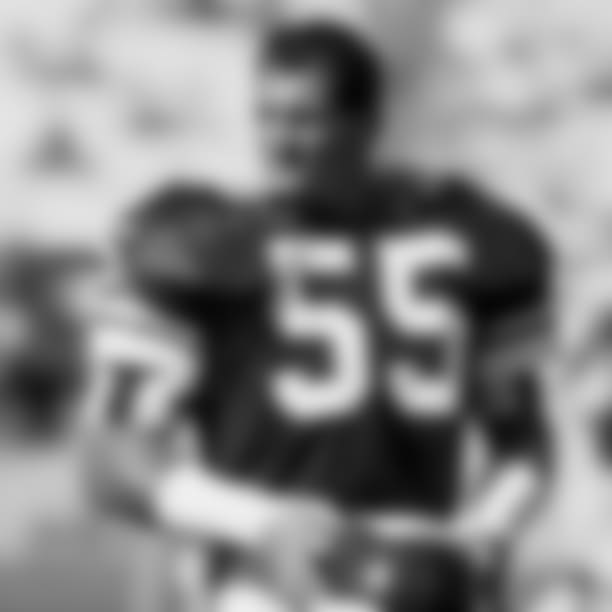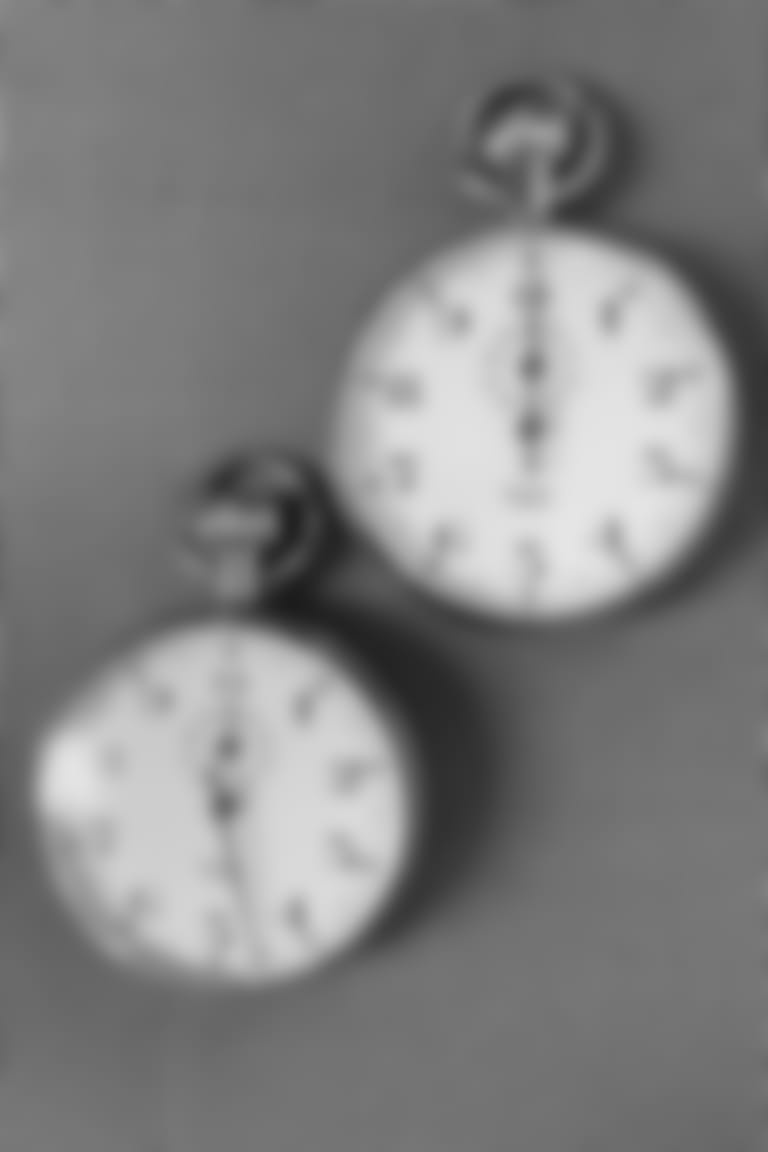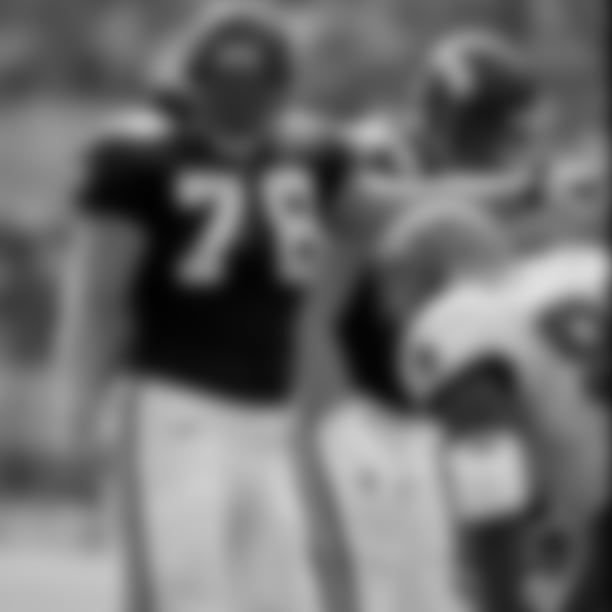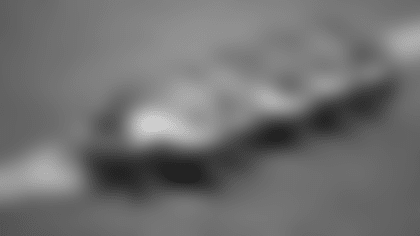There's a 10-pound trophy bass in Lake Oconee with Conrad Cardano's name on it.
The former may not be aware of that. Nor is it likely knowledgeable of the latter's determination.
Cardano is spending some of his newfound free time canvassing the 19,000-acre, manmade lake that sprawls like the city of Atlanta about 80 miles to the west but offers an unmistakable serenity.
"Lot of casting and reeling. And coming up empty," Cardano said this week after participating — and persisting — in a fishing tournament despite heavy rains.

Conrad Cardano, center, has retired after 34 years with the Vikings, a run that began in 1987.
Fishing is an apt metaphor for a football scout, but Cardano's efforts crisscrossing wide and long swaths of the country for a quarter century netted better results. He transitioned from college coaching to work for BLESTO from 1984-86 before the Minnesota Vikings noted his talents and brought him on board in 1987.
If there was a prospect in Cardano's territory, he plotted his course, hit the road and assessed acutely. Beyond his due diligence, he built relationships and a well-respected reputation.
Cardano left the road for the Vikings in 2012, but at the request of General Manager Rick Spielman, he stayed in the organization as a personnel consultant, with a focus on defensive backs. He reviewed and wrote reports to share with the personnel department through this year's draft.
The fish, if you will, came to him via digital videos and he reunited with Vikings family members at events like the Senior Bowl, NFL Scouting Combine, staff meetings and NFL Drafts.
Cardano, 73, decided it was time to fully retire from scouting and met with Spielman in May, the morning after attending the wedding of a colleague. He still plans to traverse the country (to see his far-flung family members), volunteer for community initiatives through his church and land that trophy bass.
Vikings.com interviewed Cardano this week to gather recollections from his decades with the Vikings. We also spoke with others to relay what he's meant to the organization.
Jerry Reichow hired Cardano at the Vikings. At the mention of a story on Cardano, Reichow easily reacted, "One of my favorites."
Why is that?
"Because he's such a good guy. I'd meet him [on the road]; he's different than a lot of scouts," Reichow said. "He has to meet everybody at a school. EVERYBODY. Everybody at a school loves Conrad. … All of the secretaries, all of the coaches, all of the ex-this-and-that. But he knows everybody and gets a lot of information that way that no one else gets, because he's such a friend to all of them. … I guess he's everybody's favorite, not just mine."
Spielman noted Cardano's decades of influence on new waves of scouts, including Spielman's early days on the road, and his continued contributions to help shape Minnesota's draft board.
"For someone to stay with one organization for that long is a rarity in today's NFL," Spielman said. "He brought love and loyalty to the organization but also the expertise as an evaluator to play a critical part.
"He was one of the senior members in [the draft room]," Spielman added. "As you listen to everybody's opinion on the draft and you're stacking the board, when you have a guy with that much experience and how accurate he was in his assessments and evaluations, a lot of what he said did weigh-in on the final decision process."
The Lure
Cardano played quarterback at Western Carolina (1967-70) and for the Seaboard Football League's Hagerstown Bears from 1972-73. In between, he doubled as a bartender during the days and cab driver at nights in the Tampa, Florida, area after a different Seaboard Football League team folded. Cardano coached high school football for two seasons before becoming the offensive coordinator at Catholic University (1975-78). He coached receivers at Marshall from 1979-80 and assisted for Eastern Kentucky teams that enjoyed an impressive run in FCS (Division I-AA at the time) from 1981-83.
Cardano met scouts who visited campus and maintained connections when he was out recruiting, including in Western Pennsylvania.
"I had a good friend who worked in the front office of the Steelers, so I would go up and stay at his house a couple of times. I would go over to the office and see him and met a few people over there and other scouts who came through at Marshall and Eastern Kentucky," Cardano explained. "Two of them were Jack Butler, who at the time ran the BLESTO Combine group, and then Art Rooney, Jr.," who was the Steelers Personnel Director from 1965-86 before becoming Vice President in 1987.
"Art was up at the office and in scouting at the time. I never really thought about scouting because I really wanted to coach," Cardano added. "Art came in and was looking at what I was doing. I had the 5" by 3" cards with the kids' names and everything on it. He said, 'Have you ever thought about scouting? I said, 'No, I haven't.' He said, 'Well, that's the same thing as some of the things they do.' "
The seed planted by Rooney sprouted quickly.
"Suddenly, I felt like, 'Wow, maybe I could try to do this,' " Cardano said.
Butler had two openings; one for the Northeast that was based in Pittsburgh and one referred to as the "Rocky Mountains Scout," which included parts of the Southwest and Midwest.
On flights over the Rocky Mountains to play Boise State when he was assisting at Eastern Kentucky, Cardano had peered out and thought, "Boy, I've got to live there someday."
In the spring of '84, Cardano headed to set up a home base in Colorado. His quick connections included Vikings scouts Frank Gilliam and Don Deisch, and Cardano attended Vikings Training Camps in Mankato the next three summers.
"I think Don Deisch, who worked for a number of years as a scout, recommended me to Jerry [Reichow, who at the time was the Director of Football Operations]. I had gotten to know Jerry a few times," Cardano said. "When I was a BLESTO scout, Jerry told me, 'I like to fly fish. You've got to find a couple of guys in Montana all of the time.' I was always required to put on players at Montana State and the University of Montana."
By the time the Vikings were expanding their personnel department in February of 1987, Cardano was hooked on scouting. It was akin to the best parts of recruiting for college programs without having to double as a teacher or live in football housing.
Reichow phoned and asked if Cardano wanted to work the area he had been combing for BLESTO as a member of the Vikings staff. Cardano arrived at Winter Park that day, spoke with former General Manager Mike Lynn and signed his contract.
Before hitting the road the next day, Cardano headed downstairs to watch film of returning Vikings players that included eventual Hall of Famer Chris Doleman and a bevy of current or future Pro Bowlers like Joey Browner, Keith Millard and Carl Lee, who had overlapped with Cardano at Marshall. But Cardano kept seeing 55 flash across the screen.
"Watching the defense, there were some famous guys playing back then," Cardano said. "The guy I kept noticing who was making all of the tackles was Scott Studwell. Jerry came downstairs, 'Well, what do you think?' I told him about each guy and said, 'But this guy here, he makes all of the tackles.'
"He said, 'Yeah, that's Scott Studwell.' I had known about Scott through a couple of other Vikings scouts before I came to Minnesota, but I had never really concentrated on him," Cardano continued. "That was the beginning. Scott played a few more years and then got into personnel and became a pretty close personal friend of mine after that. I got close enough to him where I knew his wife and watched the kids grow up."

Scott Studwell kept showing up on the first film that Conrad Cardano watched as a member of the Vikings. Cardano later helped Studwell transition to the personnel department.
Studwell described his "very dear friend" and mentor as "a little bit of a Renaissance Man."
"I had the opportunity to travel with him in the first year that I dipped my toes into the scouting well. Just watching him work and interact with all of the contacts in the different schools was a great learning experience for me," Studwell said. "He was a gentleman and a hard worker, very meticulous and really detailed in his approach. I learned an awful lot from him, and over the years, we became very close. I miss seeing him, but I always know he's going to be there."
The Tools
The television spectacle that has become of the NFL Scouting Combine and the rampant reporting of live action from marquee college pro days have brought consistencies, formalities and exposure, but back in Cardano's early days, so much work was done out of sight, which included loading and unloading the car.
"The fellow when I first came into scouting in BLESTO sat me down and had a whole list of things that you bring with you," Cardano said. "All of the equipment you needed for pro days: the pens, pencils, paper, a [carpenter's square], measuring tapes, cones. We used chalk back then because we didn't have the vertical jumps like they do now. [Players] had to jump and touch their hands on a wall, so you put chalk on a kid's hands.
"You find the schools and had to map out how you were going to travel," he added. "Back then, they wanted you to travel by car. … I had Montana, Wyoming, Utah, Colorado, part of Nevada, all of West Texas, New Mexico, Kansas, Arkansas and Oklahoma, and part of Missouri. That was my area."
Cardano became an expert in loading his vehicle only to unpack and repack with every campus visit.
He kept the first stopwatches issued to him by Butler, the BLESTO Combine boss, but eagerly embraced new technology when it became available.
"They were not electronic and they were not digital," Cardano said. "These were the ones that you pressed and the hands went around. The hard part was I couldn't read it fast enough before the next kid got up to run. The digitals were just starting to come out. Some scout saw them, and I went out and bought one from a sporting goods score. When I pressed the button, I could tell, 'He ran a 4.62.' "

These stopwatches were issued to Conrad Cardano by BLESTO Combine leader Jack Butler.
Carbon copies were used to write out reports in a time before computers became common and conveniently portable.
A good road atlas was critical in the pre-nav days. So were coins for pay phones to call coaches to make sure prospects would still be able to work out at the planned day or hotels to confirm or book reservations in the pre-internet era.
"And you carried a 16-mm projector, which weighed about 20 or 25 pounds, with you at all times" — except for an overnight in Boise when he accidentally left it at the airport luggage area, an "incident that scared the hell out of me."
"Because the University of Hawaii used to come over and play [schools in my territory] all of the time, Jack assigned me to go over to Honolulu to test and time the kids with another scout from the National Combine," Cardano said. "We'd go over a couple of days ahead of time because we had to study so much film, right?
"When we came back, I had a pro day, a tight end that I had to work out at Boise State," Cardano added. "I got in after an all-nighter and two [connecting flights] and picked up my luggage and left the projector right next to the belt where you pick up your luggage."
Without a projector, there was no watching of film in those days, which would severely hinder Cardano's ability to assess prospects. He dreaded the phone call to Butler.
"Jack had just given me this lens," he said. "Back then, it was over $600 because it helped make the film a little clearer, so you could see the numbers. Oh my God, they might have fired me."
Thankfully, a policeman at the airport had picked up the projector and placed it in the security department.

Conrad Cardano lugged this Kodak 16-mm film projector from campus to campus during his early days as a scout. He appreciated that it had been modified to fit under an airplane seat for the times that he flew.
The Kodak "Analyst" model passed down to Cardano was a hand-me-down that had been cut down from its original, "big, boxy" size by a previous BLESTO scout who wanted it to fit under an airplane's seat for the times when he could zip through the clouds instead of motoring down a highway.
Carry-on was the only approach for such precious cargo.
"I can remember reels of film, when you'd go to watch them, the previous scout didn't rewind the film, so you'd put it on, start it, and it would be upside down and backwards," Cardano said. "You'd have to reverse it, get an empty reel in order to get it so it would play correctly for you. You'd have to experience this to know what happens because you're pressed for time when you go into a school in the morning and to have to fool around with the tape because somebody didn't rewind it correctly was an irritating thing."
It was quite the ordeal, to say the least, but when former Oklahoma Head Coach Barry Switzer "called you over and let you listen to them call a play in the huddle during practice," it made the trip worthwhile.
The same can be said for the ability to leave no stone unturned. Those best able to map out their course and stick to their plan helped themselves greatly. Time found and preserved meant more time to gather information.
"You learned to organize not only your week but your month and two-to-three months ahead. During the day, you organized your day also," Cardano said. "You pretty much had to stay with your schedule unless something came up. It's easier today because of technology, and it's harder because you can't walk into any school you feel like walking into anymore because coaches have restrictions."
Needless to say, Cardano welcomed the efficiencies ushered in by computers, as well as the evolution that occurred with game footage from film strips to video tapes to digital and on-demand offerings. Even though he had learned how to splice film, he'd rather not.
The Stories
One of the first things Cardano did after joining the Vikings was pick out a lease car. His first choice didn't show good foresight.
"Like an idiot, the first car I leased with them was a Chevrolet Caprice, a big car with rear-wheel drive," Cardano recalled. "My son ended up calling it 'The Sled' because in the snow it was terrible. It was the dumbest thing. All I was thinking was big and comfortable when I traveled all of that area. After that, I wised up and got myself a Jeep Cherokee because it was four-wheel drive."
Cardano had already moved on from "The Sled" when he welcomed "Stud" to the trail.
Studwell had completed the playing career that would land him in the Vikings Ring of Honor and transitioned to the personnel department, continuing what became his 42-year run with the organization.
"Jerry came to me and said, 'Scott's going to start scouting with us. I want you to take him out on the road and show him' — it was in the spring, so I was going to show him the basics of working a pro day at a college.
Studwell flew into Denver, and the two headed for the University of Colorado. They watched film, took physical measurements and put prospects through timing and testing drills. The University of Wyoming was the following day, but on the way to Laramie, they stopped at Cardano's house in Fort Collins for dinner.
"My son Christopher was a big-time Vikings fan, and all he wanted was a football jersey of Scott Studwell," Cardano explained. "My son came in and met Scott and was in awe the whole time."
They loaded up but hit a snowstorm while trying to go through the mountain pass.
"Couldn't see. It was blowing really hard, so I pulled in behind a tractor trailer and turned my lights off and followed him very closely and just kind of let him clear the way until we got through the pass to get to Laramie," Cardano said.
Studwell recalled: "He turned the lights off so we could see better, and we're driving through the mountains in the snow. It was dark, and I'm like, 'What is this crazy fool doing now?' But he had done it before, obviously, or it seemed like the right thing to do at the time. He was driving, so I just had to bite my tongue and stay quiet, and we got there. I'm glad I didn't ride with him in ['The Sled']."
They made it through with help of the lead blocking by the semi, and Cardano noted that a Wyoming coach "was nice enough to meet Scott and me at a bar that night. We had a couple of beers and talked about the players."
Up next was heading back to Denver to fly to "Las Vegas, of all places."
"Scott happened to have some friends there, and his buddy put us up at one of his hotels," Cardano recalled. "Scott and I were in this huge suite, and our rooms had velvet, heart-shaped beds. After we checked in, his buddy had brought, I don't know how many, it must have been 10 or 11 people to meet Scott."
Studwell chuckled at the memory: "We stayed in luxury. I think there were heart-shaped beds or a heart-shaped tub or something, which really didn't do a lot for a couple of scouts just trying to find a place to put their heads down. Obviously we did not take advantage of the luxurious accommodations, but I remember it for sure."
Cardano recalled high winds canceling that pro day, so Studwell headed back home and Cardano continued on to the next school. Studwell was ready to make his own trips, but the duo reconnected on future campus visits.
"I actually had to teach him how to pack the back of a car," Cardano said. "He would just throw his suitcase in some area. 'Oh no, I've got to have it over here. I've got to have it nice and organized.' It's been a long friendship with him and his family, one that I've always treasured."
Cardano and Studwell got along great, working effectively on collective trips and independently.
While they weren't Lemmon and Matthau, they definitely incorporated different approaches.
"He's about as far from Studwell as you can get," Reichow said. "Stud's got to be going a hundred miles an hour, and Conrad's, 'Oh, we've got to talk to this person.' You know how Scott is, he's got to be moving. He's always doing something."
"He and Conrad would go into these different schools, and Conrad goes over to meet the secretary, and another one, and another one," Reichow added. "Studwell is going crazy waiting on him. He'd come back and say, 'He's driving me crazy.' He knows everybody out here, and I'm trying to get something done.' He broke Studwell in right."

Jerry Reichow joined the Vikings personnel department in 1965 after playing for the team in its first four seasons. Reichow brought Conrad Cardano to the Vikings in 1987 and worked with him until Reichow retired in 2019 after 59 total seasons with Minnesota.
Removed from the moment of trying to get things done on his time, Studwell said Cardano was "certainly a true professional."
"He had lots of contacts in all of these schools that he would go into," Studwell said. "He had created them over the years; regardless of the area he worked in, he was very well-known from all of the staffs that we visited.
"He was very thorough, very cordial. He's a very likeable person, number one, very polite and respectful. I think all of the schools that we went into appreciated that from him," Studwell added. "He's an easy guy to like, an easy guy to get along with. He was very patient when you'd go into a school, very respectful of their rules, and not everybody was that way. He certainly set the bar for me, and we were a little different. I'm wired differently than Conrad is. I was always in a hurry, whereas he was very patient. We got the same amount of information, typically, but we got it in a different way."
In addition to bringing along younger scouts, Cardano also enjoyed a particular trip to the University of Montana with Reichow.
"They didn't really have many prospects. They had some young kids that may become prospects, so I met him there in Missoula, and we went to practice in our fishing outfits, our waders and stuff," Reichow laughed.
Grizzlies Head Coach Don Read didn't seem to mind.
Reichow recalled: "He walked over to us while we're watching practice and said, 'You guys going fishing?' We said, 'Yeah, after practice.' He said, 'Is [assistant coach Bob] Beers going with you?' 'Uh, yeah, we talked about that.' "
Trout fishing creeps into the mind as one gazes at the adjacent Clark Fork River during practice lulls.
"The coach actually moved the drills over closer to the river, a great trout stream," Cardano said. "That was an exception because all scouting is not like that."
Reichow added: "[Read] hollered and said, 'Beers, c'mon over here, and you guys go fishing. We don't have any prospects. Get out of here and go fishing.' So we had a great time out there, and everybody loved Conrad, so we could do that."
Beers later became an NFL scout for the Broncos, Lions and Texans before retiring in 2016.
Not every trip flowed as smoothly or featured those posh Vegas accommodations.
One year, Cardano went roughly 250 miles from the University of Colorado in Boulder over the mountains to Mesa State (now Colorado Mesa University) in Grand Junction. Up next was a small school in Durango, a trek that included the harrowing Million Dollar Highway with three mountain passes that are at more than 10,000 feet of elevation.
Cardano hit a bad snowstorm with icy roads and called the coach, who assured him that six players would be ready for measurements and a workout.
"So I pulled into a hotel. I think it was $14.50 that night, had one light in the middle of the room that you had to pull a string to turn on, and you had to light the kerosene heater in the room," Cardano recalled. "It was freezing cold when I got in the room. It was a bed and a bathroom, and that was it.
"I woke up the next morning, and it was 18 inches of snow on my car. I traveled six hours. It was hairy going over the mountains and everything," he added. "I got to the school, and five of the kids were sick and did not work out. There was only one, and he was one that I didn't care less if I got anyway. That's the kind of thing that could happen to you back then."
Cardano nearly "met" Spielman for the first time back when he was an assistant Eastern Kentucky and the future Vikings GM was playing linebacker at Southern Illinois, but a loss in the playoffs by the Colonels prevented a game with the Salukis.
Instead, their initial encounter occurred after Spielman was a green BLESTO scout for Detroit, just beginning his career climb. In addition to evaluating prospects, Spielman also wanted to absorb everything he could from the personnel pros.
"You kind of gravitate toward guys that are respected in the business, and me as a young scout, trying to learn from him and ask him questions, even though I was with another team, on how he does this or makes contacts," Spielman said. "Back then, I was just trying to figure out how to get to the schools because we used road maps.
"I tell all the young scouts, we tell stories, and they think we're from Mars," Spielman added more than 30 years after his first forays. "The first thing you bought was a road atlas of the United States, and you had to map out how you were going to get there. It wasn't all of the superhighways, either. Bare-knuckle scouting."
Spielman absorbed knowledge from Cardano and Studwell and applied it for the next decade-and-a-half, becoming the Vikings Vice President of Player Personnel in 2006 (and GM in 2012).
"I remember when Rick broke into scouting because he was out of BLESTO and had to give his reports like some of the other guys. You could tell that Rick was very detailed," Cardano recalled. "You could kind of tell that he was going to move up quickly. He is really highly organized and does a great job, but I remember when he was a young scout."
Spielman ventured on the road with Cardano once. It was memorable and has grown over the years like a harmless "big one" fish story.
After wrapping their work at Georgia's Pro Day, Cardano drove to dinner and Spielman typed reports in the back seat. Cardano had a nice restaurant in mind that had previously met his approval. He spotted it but turned wrongly onto a two-lane, one-way street, resulting in a fender-bender.
"It went from a fender-bender to the jaws-of-life having to take us out of the car, to they shut down the entire city of Athens, to maybe the worst car crash in American history," Spielman said with a laugh. "It's amazing how the story grew from a fender-bender. It just got bigger every year we talked about it."
Cardano emphasized that "the rental car company didn't even charge us," but according to Rick "he had to put his neck in a brace and the helicopters came in and the police and the crowds just joined around the side."
"He was not so hurt that he couldn't eat his meal in five minutes at a very nice restaurant," Cardano said. "I'm sitting down, just ready to relax after all of the hullabaloo outside with the accident, and the next thing I know, he's done. He eats quickly, and he gets it everywhere."
The University of Florida was next, and Spielman hopped back in the back seat to do some more reports, but Cardano recalled Spielman dozing off for a couple of hours on the way to The Swamp.
The Finds
Cardano's first season with the Vikings was one of the most improbable in team history. A players' strike canceled one game and led to the use of replacement players in three other contests. Minnesota went 0-3 during that run, but an 8-7-1 finish was good enough for a Wild Card spot. Upset wins at New Orleans and San Francisco placed Minnesota in the NFC Championship Game.
It was the first of five conference title game appearances by the Vikings during Cardano's tenure and one of three that came down to the wire only to end in crushing disappointment.
Everything he did on the job was about trying to get the Vikings back and beyond.
Minnesota's second draft with Cardano on board involved the selection of Hall of Famer Randall McDaniel out of Arizona State in the first round and Al Noga out of Hawaii in the third.
"Believe it or not, we were actually going to draft another guy, but the Steelers drafted the kid (defensive end Aaron Jones out of Eastern Kentucky)," Cardano recalled. "They drafted him ahead of us, so Randall was sitting there, and we drafted him. That was all she wrote. I had just seen him playing in college, and he obviously was really good."
Cardano said Paul Wiggin, now a personnel consultant with the Vikings, did a great job of coaching Noga.
"Paul was very influential, and I learned a lot of stuff from him about defensive line play," said Cardano, who also "picked up a lot" from Seahawks Head Coach Pete Carroll back when he coached defensive backs for Minnesota.
Cardano transitioned to the East after a couple of other retirements, pretty much working everywhere east of the Mississippi River by the mid-1990s.
Most people start their memories of 1998 with the record-setting play of rookie Randy Moss, whose 17 receiving scores helped an offensive explosion, or the pain of falling in the NFC Championship Game.
Cardano was well-acquainted with Moss because he had previously worked with former Marshall Head Coach Bob Pruett. Moss's fall to the Vikings at 21 overall was quite the X-factor, but he wasn't the only future Pro Bowler nabbed that year.
"No one really knew much about Matt Birk. A BLESTO scout called me and said he just saw this kid," Cardano said. "I had already been through the Northeast, and I called Frank Gilliam and said, 'Is it OK if I go up and take a look at this kid at Harvard?' I went up there, met him and liked him — and liked him on tape. I told Frank about him, and I think Frank was able to get him in what they called the [now defunct] Blue-Gray [college all-star game]. They played down in Montgomery, Alabama, right before Christmas. He came in a day late, and you could tell that he got better as the week went on.
"Then, he fell to us in the draft [at No. 173 overall in the sixth round], which, I was thrilled," Cardano added. "It was a memorable time because you find kids you like, but you don't always get a chance to draft them. It worked out. Mike Tice coached him and did a hell of a job with him, and obviously helped him become a Pro Bowl center."

Conrad Cardano helped the Vikings land Matt Birk after making a second trip through the Northeast late in 1997. He was elated when Birk was still on the board in the sixth round of the 1998 NFL Draft.
In 2012, Cardano transitioned to the consultant role with an emphasis on evaluating defensive backs, a position group that many say is tough to evaluate without a knack like his.
"Those defensive backs, you've got to have a feel for it," said Reichow, who was the first Vikings receiver to make a Pro Bowl after the team's inaugural 1961 season. "All of this footwork and watching them drop, but he was really good at it."
Studwell added: "It was probably a little bit of a niche that he had early on. The DBs are, quite honestly, very hard to evaluate at times, but he had his way of doing things, and he had a really good feel for the position. He studied them and watched tons and tons of tape on these players. It was always very meticulously presented, and you respected his opinion. Right, wrong or indifferent, he always did the work and spent the time, so it was always valuable pieces of information on all of the players he evaluated, but he just had a really good feel for the DBs."
Broncos GM George Paton, who played defensive back for four seasons at UCLA and was with Minnesota from 2007-2020, looked forward to reconnecting with Cardano every time. The conversation usually began with defensive backs before transitioning to less business-oriented affairs.
"He had a great eye for DBs. We always kind of liked evaluating DBs, and a lot of people don't," Paton said. "We didn't always agree, and that was the best part of it because he had such a great way about him, very commonsensical, and a great way of communicating and deliberating.
"Think of all the great DBs that have been there in Connie's tenure, and he's had a piece of every one of them, whether it was fighting for a guy in a meeting or evaluating them and getting sources on the background, the character," Paton added.
The consultant role with the focus on defensive backs was further enhanced by the arrival of Head Coach Mike Zimmer in 2014.
"Coach Zim' is an excellent defensive backs coach," Cardano said. "That was one of the reasons I really concentrated on defensive backs when I finished scouting and became a consultant. Rick knew I enjoyed doing the defensive backs, so I would do that."
Interestingly, Cardano recalled first meeting Zimmer when he was at Weber State, where Zimmer coached defensive backs from 1981-82 before he was elevated to defensive coordinator (1983-88).
"You could tell the guy was a heck of a coach because you would talk to him about the defensive guys, but you could see that he was going to go places," Cardano said.
The Family
The frantic pace on the road and collective time away from home created a need to find a balance. Cardano would try to maximize time with his wife and two sons when he was home, even if it meant staying up late to finish reports after the children went to bed.
"It's not a great family job," Cardano said. "You really had to learn how to balance things out because basically you were on the road for two weeks and you'd get home, let's say if you went to a game on a Saturday, you'd either drive home or fly, depending on where you were. You'd get home for a couple of nights, get all of your reports in by Monday and you'd take off again."
Family fishing and camping trips made the small pockets of time special.
It's no wonder why the scouts enjoy building a familial relationship, even with members of other teams, but especially within the same team that wakes up every day thinking about the same goal.

Conrad Cardano and the personnel department pose for a photo on the field before a Vikings Training Camp practice at Minnesota State, Mankato. He first attended a Vikings Training Camp in 1984 while working as a scout with BLESTO.
Cardano thrived at opportunities to bring people together.
Paton's role didn't take him on the road to college campuses, but he did connect with Cardano at events like the Senior Bowl and NFL Combine.
"He was glue. He always brought everyone together," Paton said. "When things were down, he brought levity to the situation and seemed to always bring people together, whether he was organizing dinners, gatherings, beverages.
"He was just an amazing scout. He had an amazing feel for the game, worked really hard, but didn't take himself too serious," Paton added. "He always felt that we had to have fun because we were working so hard, so I always appreciated that side of him. He loved rhythm and blues. Every now and then, he'd turn it loose on the dance floor, and those were some of the better memories at the Senior Bowl, whenever he let 'Twinkletoes' get it going. He was amazing. It's hard to describe him, but he was unique as a person, as a scout, and the Vikings benefitted a lot of years through his scouting and all of the great players they've had over the years he was there."
Studwell agreed: "He can let his hair down, what little he has left. I'm in the same boat, but we had a lot of great times together, a lot of great road trips together. He took his job seriously, but he did not take himself too seriously. He was a little bit of a chameleon where he could interact with a lot of different groups of people and if anybody says a bad word about Conrad, I would question their character, not his. He's one of those guys that's very likeable and very respectful and truly a very good friend."
Spielman's retirement wishes for Cardano are "a well-deserved break for him and his wife" and avenues to show his "true passion" for helping others.
As much as he enjoyed the road, Cardano appreciated that the consultant role kept him home with his wife, Gloria, who survived breast cancer in 2012. They'll now comb the waters of Lake Oconee and travel to see family members that are scattered across the country.
He also plans to be involved with community initiatives led by his church. Groups visit veterans as well as inmates as part of the ministry, and he wants to continue to find other ways to impact the community, a desire that he said intensified after the tragic killing of George Floyd in Minneapolis in May 2020.
"It really was something in me that turned and said, 'Football was great, and I truly enjoy it, but there needs to be something else done. Maybe there's something I can do in the community,' " Cardano explained.
Studwell looks forward to staying connected across the miles and all future reunions.
"He's one of those guys that I think, once you get to know him, he's a very likeable, sincere, honest person that generally cares about you and your family," Studwell said. "My mom passed away a week ago, and I've heard back from him three or four times, so he cares. He cares about people, and he cares about his friends and family and is genuine as the day is long."
By: Craig Peters






